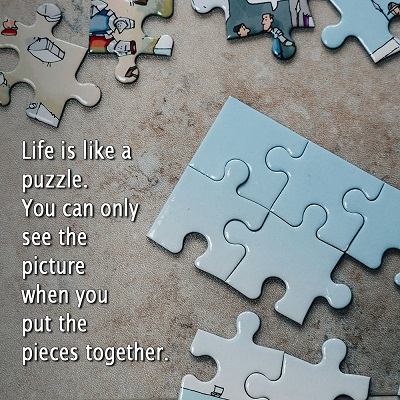 Did you play with jigsaw puzzles when you were young? Do you enjoy doing them as an adult? Each piece that fits makes you feel like a winner! Even while looking for the next piece to place, it’s rather meditative. You get lost in a trance almost, yet excited when you find the right piece or spot to put it.
Did you play with jigsaw puzzles when you were young? Do you enjoy doing them as an adult? Each piece that fits makes you feel like a winner! Even while looking for the next piece to place, it’s rather meditative. You get lost in a trance almost, yet excited when you find the right piece or spot to put it.
Jigsaw puzzles don’t just pass the time, they have a beautiful way of nurturing the mind and creating a sense of accomplishment. For seniors facing memory loss or early dementia, jigsaw puzzles offer a way to engage their mind, make them relax, and even spark a bit of excitement.
Why Jigsaw Puzzles Are Helpful for Memory
Doing a jigsaw puzzle is like giving the brain a gentle workout. You have to focus on colors, shapes, and patterns, which keeps different parts of the mind engaged. The very act of connecting puzzle pieces strengthens mental pathways that contribute to short-term memory, problem-solving, and spatial awareness.
Jigsaw puzzles also allow you to work at your own pace. There’s no rush, no pressure to remember everything, just a quiet satisfaction that comes with seeing progress, one piece at a time.
Choosing the Right Puzzle
When it comes to puzzles for someone with memory challenges, simple adjustments can make a big difference in comfort and enjoyment.
Make sure you choose puzzles with larger pieces. That way they are easier to see and handle. There are puzzles designed for adults with dementia or vision impairments, and they usually come with pieces that are big enough to hold comfortably, making the puzzle a lot more enjoyable.
Watch the total number of pieces too. Instead of choosing a 1,000 piece puzzle, choose something simple, like a 25 or 50 piece puzzle. This size puzzle may still be difficult for them to do, however, it won’t be anywhere near as overwhelming as a 1,000 piece one.
As for the picture you choose, make sure it is personally meaningful to them. They may love landscapes of places they have traveled, or animal puzzles, or still fruits and baked goods. Sometimes a picture of a beach, a beautiful garden full of flowers, or a familiar cityscape can make them excited to start and spark beautiful memories too.
Setting Up To Begin
You want to be able to stop and start in a comfortable place. So creating a comfortable and inviting puzzle setup can add to the enjoyment and ease of the activity. You will need good lighting and a stable surface.
If you can’t set a table up to use, where the puzzle may be laid out for a few days, you can always use a board, and that way it can be moved to another part of the house easily.
Another helpful tip is to use a puzzle tray, which helps to see all the pieces clearly and keeps them from getting lost. It too can be moved around easily if you want to take a break and come back later.
Next, let them take their time. There is no rush! This is an activity meant to be enjoyed, piece by piece. So let them enjoy watching the picture grow. If you get all competitive it will only make them want to stop, and that’s no help to them at all. It’s their game, let them play by their rules.
Ways to Enjoy Jigsaw Puzzles at Different Stages of Memory Loss
If memory loss is just starting to set in, choose a smaller piece puzzle. A 100 piece puzzle with slightly larger pieces may be a comfortable choice.
Don’t forget, if you are helping someone with memory loss, talk while you place the pieces and use the picture as a way to talk about shared stories and memories.
If their memory loss is more progressed, a 25 to 50 piece puzzle with larger pieces can be ideal. Choose simple images with clear, bold shapes and colors. Working on a few pieces each day rather than completing it in one sitting can give a sense of accomplishment over time, allowing them to revisit the puzzle each day with fresh energy.
If they are in the later stages of dementia, it gets a little more difficult, however, simple puzzles with 10 to 20 large pieces can provide a wonderful experience. Just like when we were children, completing the puzzle felt amazing! They will feel the same when they see the picture completed.
Jigsaw puzzles are fun and so many of them are beautiful to look at. Find a puzzle that will speak to them and open up their memories! It’s like anything in our life. One small step can make all the difference, and so can one small piece.
I must warn you, finishing a beautiful puzzle with someone can become addictive, so don’t just choose one! You may find they want to start another puzzle as soon as they finish. So get a few just in case.






